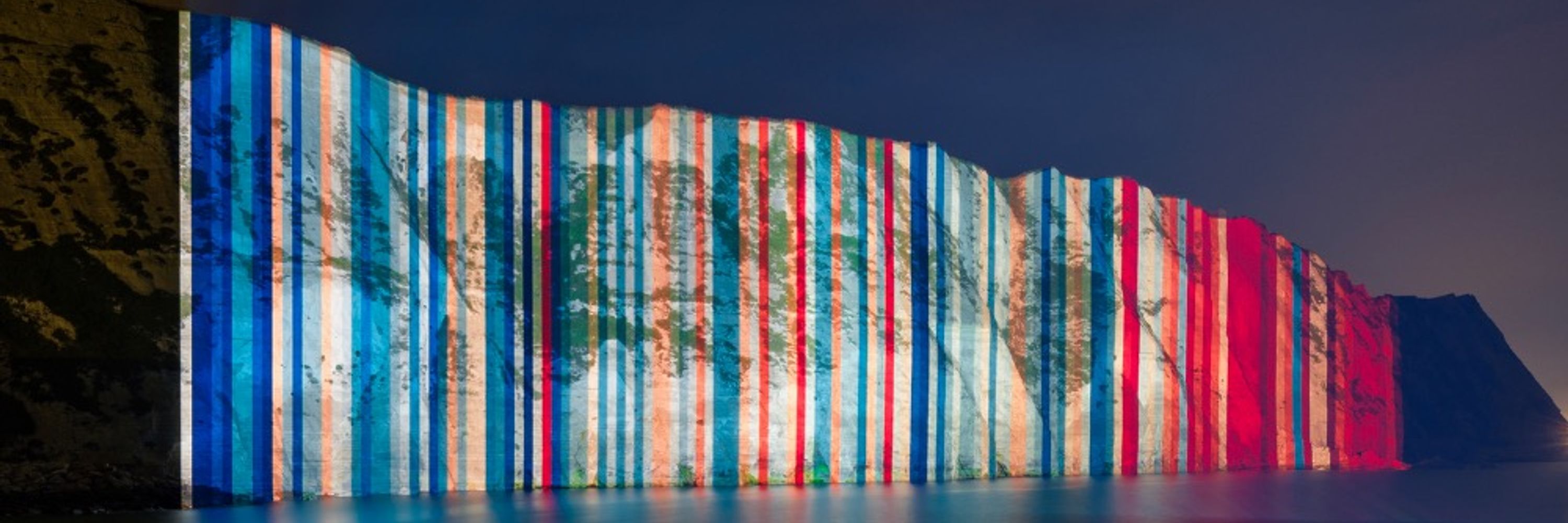
Ed Hawkins
@edhawkins.org
Climate scientist at the National Centre for Atmospheric Science, University of Reading | IPCC AR6 Lead Author | MBE | Views own | https://edhawkins.org
Warming Stripes: http://www.ShowYourStripes.info
Warming Stripes: http://www.ShowYourStripes.info
A damaging hurricane in a warmer world
How would a major hurricane that hit Jamaica in 1903 be different today, in a warmer world?
It would drop more rain. (At least)
climatelabbook.substack.com/p/a-damaging...
How would a major hurricane that hit Jamaica in 1903 be different today, in a warmer world?
It would drop more rain. (At least)
climatelabbook.substack.com/p/a-damaging...

November 2, 2025 at 9:21 AM
A damaging hurricane in a warmer world
How would a major hurricane that hit Jamaica in 1903 be different today, in a warmer world?
It would drop more rain. (At least)
climatelabbook.substack.com/p/a-damaging...
How would a major hurricane that hit Jamaica in 1903 be different today, in a warmer world?
It would drop more rain. (At least)
climatelabbook.substack.com/p/a-damaging...
In August 1903 a cat 3 hurricane hit Jamaica causing significant damage.
Our reanalysis-based approach (esd.copernicus.org/articles/14/...) can examine how that storm would be different in a warmer world like today.
Then & now precipitable water fields show heavier rain would be likely.
#Melissa
Our reanalysis-based approach (esd.copernicus.org/articles/14/...) can examine how that storm would be different in a warmer world like today.
Then & now precipitable water fields show heavier rain would be likely.
#Melissa

October 26, 2025 at 8:49 AM
In August 1903 a cat 3 hurricane hit Jamaica causing significant damage.
Our reanalysis-based approach (esd.copernicus.org/articles/14/...) can examine how that storm would be different in a warmer world like today.
Then & now precipitable water fields show heavier rain would be likely.
#Melissa
Our reanalysis-based approach (esd.copernicus.org/articles/14/...) can examine how that storm would be different in a warmer world like today.
Then & now precipitable water fields show heavier rain would be likely.
#Melissa
A request for weather interested volunteers!
Met Eireann would like to rescue millions of weather observations taken in Ireland over many decades that are still stuck on paper. #WeatherRescue
Anyone can help: www.zooniverse.org/projects/met...
Met Eireann would like to rescue millions of weather observations taken in Ireland over many decades that are still stuck on paper. #WeatherRescue
Anyone can help: www.zooniverse.org/projects/met...

October 16, 2025 at 7:25 AM
A request for weather interested volunteers!
Met Eireann would like to rescue millions of weather observations taken in Ireland over many decades that are still stuck on paper. #WeatherRescue
Anyone can help: www.zooniverse.org/projects/met...
Met Eireann would like to rescue millions of weather observations taken in Ireland over many decades that are still stuck on paper. #WeatherRescue
Anyone can help: www.zooniverse.org/projects/met...
UK air temperatures and soil temperatures are warming at the same rate
climatelabbook.substack.com/p/monitoring...
climatelabbook.substack.com/p/monitoring...

October 9, 2025 at 12:17 PM
UK air temperatures and soil temperatures are warming at the same rate
climatelabbook.substack.com/p/monitoring...
climatelabbook.substack.com/p/monitoring...
2) Soil temperatures monitored across the UK since 1959 show the same long-term trend with slightly smaller variations from year-to-year as the soil integrates weather fluctuations.
Should we use soil temperatures more for climate monitoring?
Details: climatelabbook.substack.com/p/monitoring...
Should we use soil temperatures more for climate monitoring?
Details: climatelabbook.substack.com/p/monitoring...

October 8, 2025 at 10:51 AM
2) Soil temperatures monitored across the UK since 1959 show the same long-term trend with slightly smaller variations from year-to-year as the soil integrates weather fluctuations.
Should we use soil temperatures more for climate monitoring?
Details: climatelabbook.substack.com/p/monitoring...
Should we use soil temperatures more for climate monitoring?
Details: climatelabbook.substack.com/p/monitoring...
Two sources of corroboration for the UK temperature series are:
1) Independent reanalyses such as ERA5 (1950-2024) and 20CRv3 (1884-2015), which show the same trends and variability in UK temperature as the official Met Office series.
More details: climatelabbook.substack.com/p/monitoring...
1) Independent reanalyses such as ERA5 (1950-2024) and 20CRv3 (1884-2015), which show the same trends and variability in UK temperature as the official Met Office series.
More details: climatelabbook.substack.com/p/monitoring...

October 8, 2025 at 10:51 AM
Two sources of corroboration for the UK temperature series are:
1) Independent reanalyses such as ERA5 (1950-2024) and 20CRv3 (1884-2015), which show the same trends and variability in UK temperature as the official Met Office series.
More details: climatelabbook.substack.com/p/monitoring...
1) Independent reanalyses such as ERA5 (1950-2024) and 20CRv3 (1884-2015), which show the same trends and variability in UK temperature as the official Met Office series.
More details: climatelabbook.substack.com/p/monitoring...
Our paper on historic rainfall observers was discussed in The Times weather column this week, highlighting the role of the thousands of (often) volunteers who dedicated decades to taking detailed measurements of the weather.
rmets.onlinelibrary.wiley.com/doi/10.1002/...
rmets.onlinelibrary.wiley.com/doi/10.1002/...

October 7, 2025 at 8:00 AM
Our paper on historic rainfall observers was discussed in The Times weather column this week, highlighting the role of the thousands of (often) volunteers who dedicated decades to taking detailed measurements of the weather.
rmets.onlinelibrary.wiley.com/doi/10.1002/...
rmets.onlinelibrary.wiley.com/doi/10.1002/...
The @metoffice.gov.uk use weather station observations to reconstruct changes in UK average temperature since 1884.
@copernicusecmwf.bsky.social produce the ERA5 reanalysis which reconstructs global weather every hour back to 1950 using a weather forecast model.
Their estimates agree. Just sayin'.
@copernicusecmwf.bsky.social produce the ERA5 reanalysis which reconstructs global weather every hour back to 1950 using a weather forecast model.
Their estimates agree. Just sayin'.

October 6, 2025 at 9:03 AM
The @metoffice.gov.uk use weather station observations to reconstruct changes in UK average temperature since 1884.
@copernicusecmwf.bsky.social produce the ERA5 reanalysis which reconstructs global weather every hour back to 1950 using a weather forecast model.
Their estimates agree. Just sayin'.
@copernicusecmwf.bsky.social produce the ERA5 reanalysis which reconstructs global weather every hour back to 1950 using a weather forecast model.
Their estimates agree. Just sayin'.
Well done to the Warming Stripes La Rochelle team!
Starting climate conversations in France! 👏
Starting climate conversations in France! 👏

October 4, 2025 at 10:56 AM
Well done to the Warming Stripes La Rochelle team!
Starting climate conversations in France! 👏
Starting climate conversations in France! 👏
The Greater Roadrunner (or Geococcyx californianus) knows how to #ShowYourStripes!
Image: @watchinthesky.bsky.social
Image: @watchinthesky.bsky.social

August 22, 2025 at 2:57 PM
The Greater Roadrunner (or Geococcyx californianus) knows how to #ShowYourStripes!
Image: @watchinthesky.bsky.social
Image: @watchinthesky.bsky.social

August 21, 2025 at 9:05 AM
Arguably, the moment the Royal Charter sank off Anglesey in Wales on the morning of 26th October 1859 was the moment that weather forecasting began.
climatelabbook.substack.com/p/the-storm-...
climatelabbook.substack.com/p/the-storm-...

August 20, 2025 at 8:31 PM
Arguably, the moment the Royal Charter sank off Anglesey in Wales on the morning of 26th October 1859 was the moment that weather forecasting began.
climatelabbook.substack.com/p/the-storm-...
climatelabbook.substack.com/p/the-storm-...
Deborah Martorell, a broadcast meteorologist from Puerto Rico, was a member of the latest Blue Origin crew on a sub-orbital flight.
She took the warming stripes to space. #ShowYourStripes
She took the warming stripes to space. #ShowYourStripes
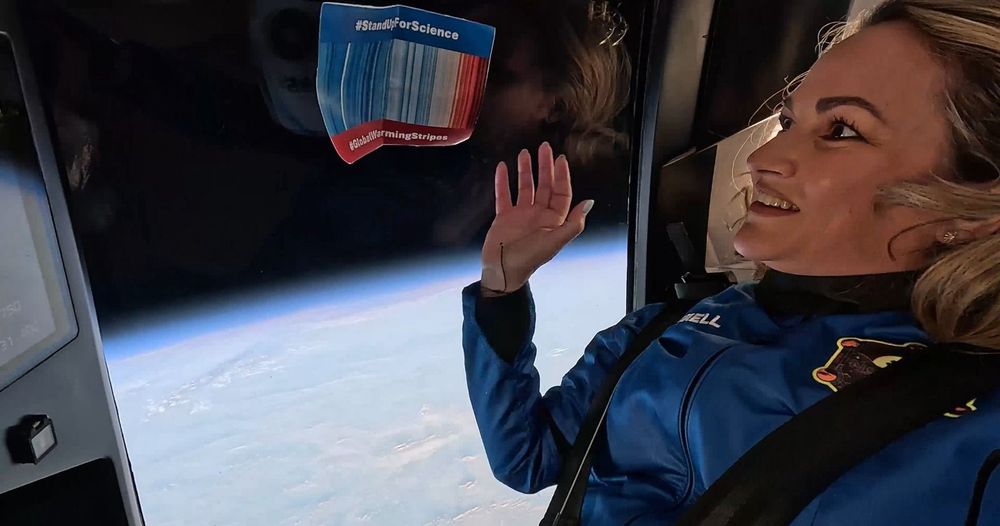
August 8, 2025 at 10:16 AM
Deborah Martorell, a broadcast meteorologist from Puerto Rico, was a member of the latest Blue Origin crew on a sub-orbital flight.
She took the warming stripes to space. #ShowYourStripes
She took the warming stripes to space. #ShowYourStripes
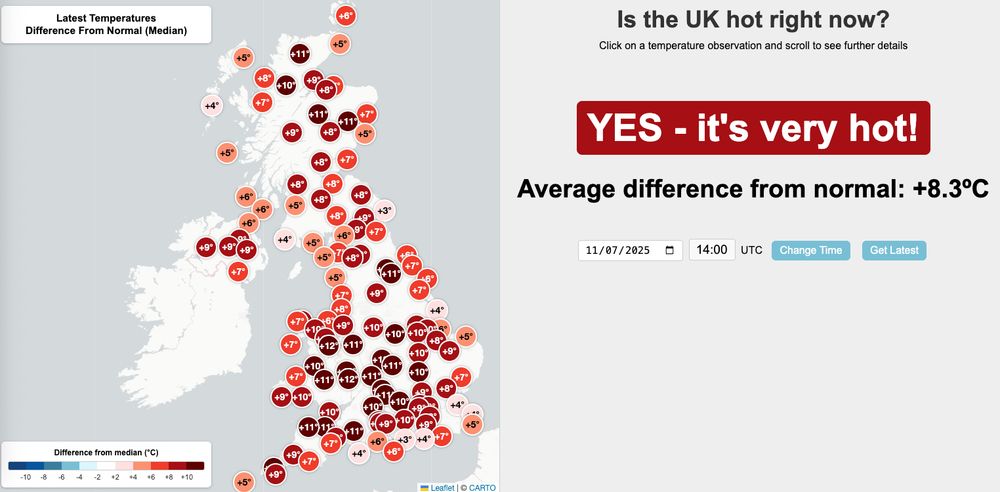
July 11, 2025 at 2:27 PM
As the latest UK heatwave starts, it's very warm (5-6°C above normal) across the most of the country.
Watch how things change hour-by-hour: istheukhotrightnow.com
Website by @roostweather.bsky.social.
Watch how things change hour-by-hour: istheukhotrightnow.com
Website by @roostweather.bsky.social.
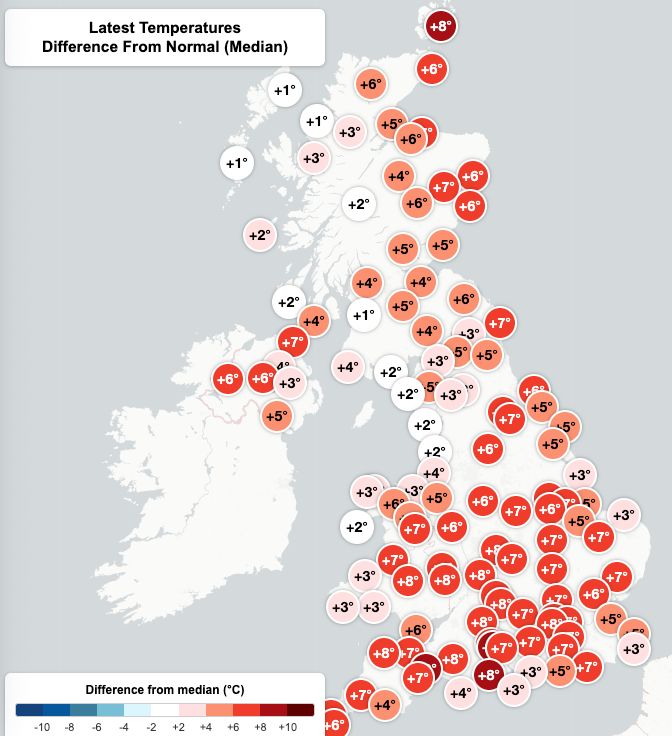
July 10, 2025 at 11:44 AM
As the latest UK heatwave starts, it's very warm (5-6°C above normal) across the most of the country.
Watch how things change hour-by-hour: istheukhotrightnow.com
Website by @roostweather.bsky.social.
Watch how things change hour-by-hour: istheukhotrightnow.com
Website by @roostweather.bsky.social.
Many of these were collated by Callendar (1958) to show a rise over time, just before the International Geophysical Year when Keeling started
www.tandfonline.com/doi/abs/10.3...
www.tandfonline.com/doi/abs/10.3...
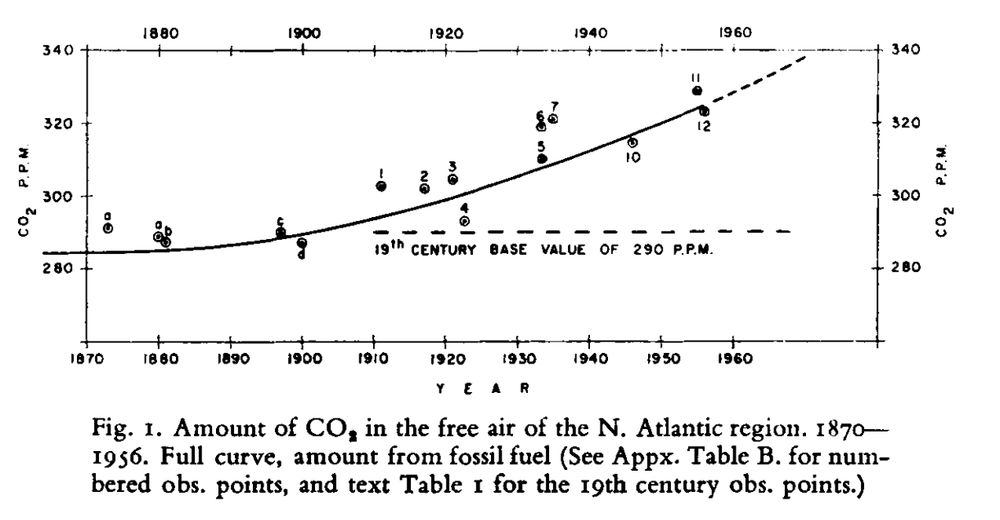
July 10, 2025 at 8:44 AM
Many of these were collated by Callendar (1958) to show a rise over time, just before the International Geophysical Year when Keeling started
www.tandfonline.com/doi/abs/10.3...
www.tandfonline.com/doi/abs/10.3...
BBC Radio 4's The Infinite Monkey Cage is celebrating its 201st birthday episode on Thursday at 11am.
Questions include: 'so, climate change, are we screwed?' from Nish Kumar
Also featuring Brian Cox, @robinince.bsky.social, @deborahmeaden.bsky.social & Mel Giedroyc
www.bbc.co.uk/programmes/m...
Questions include: 'so, climate change, are we screwed?' from Nish Kumar
Also featuring Brian Cox, @robinince.bsky.social, @deborahmeaden.bsky.social & Mel Giedroyc
www.bbc.co.uk/programmes/m...

July 9, 2025 at 7:43 PM
BBC Radio 4's The Infinite Monkey Cage is celebrating its 201st birthday episode on Thursday at 11am.
Questions include: 'so, climate change, are we screwed?' from Nish Kumar
Also featuring Brian Cox, @robinince.bsky.social, @deborahmeaden.bsky.social & Mel Giedroyc
www.bbc.co.uk/programmes/m...
Questions include: 'so, climate change, are we screwed?' from Nish Kumar
Also featuring Brian Cox, @robinince.bsky.social, @deborahmeaden.bsky.social & Mel Giedroyc
www.bbc.co.uk/programmes/m...
The Warming Stripes have been extended again into the mesosphere to help highlight risks to our climate monitoring capabilities.
Like the stratosphere, the mesosphere is cooling due to the greenhouse effect & also shows solar cycle variations. (Thanks to @sosprey.bsky.social for the data.)
But...
Like the stratosphere, the mesosphere is cooling due to the greenhouse effect & also shows solar cycle variations. (Thanks to @sosprey.bsky.social for the data.)
But...
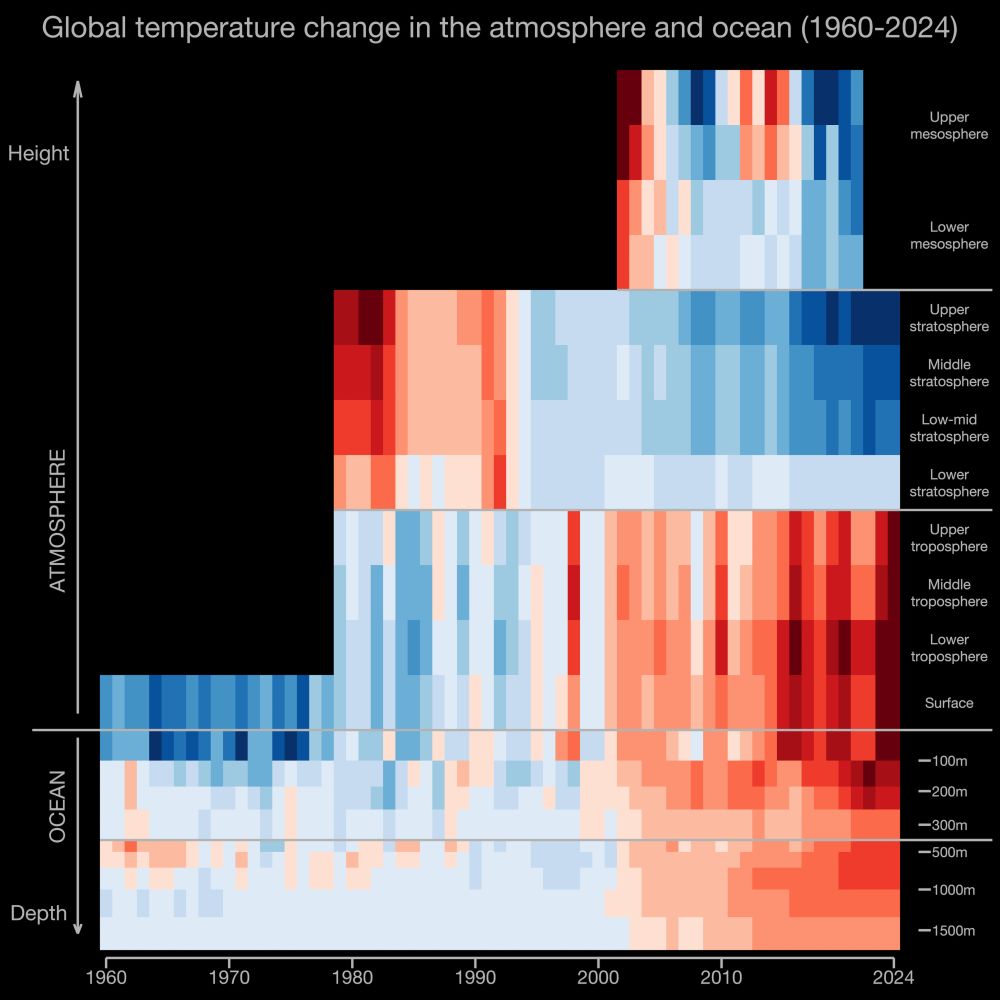
July 7, 2025 at 10:49 AM
The Warming Stripes have been extended again into the mesosphere to help highlight risks to our climate monitoring capabilities.
Like the stratosphere, the mesosphere is cooling due to the greenhouse effect & also shows solar cycle variations. (Thanks to @sosprey.bsky.social for the data.)
But...
Like the stratosphere, the mesosphere is cooling due to the greenhouse effect & also shows solar cycle variations. (Thanks to @sosprey.bsky.social for the data.)
But...
In a UK newspaper opinion piece today, Matt Ridley (climate confuser) says: "winter nighttime temperatures have risen faster than summer daytime ones"
Um, no, not for the UK which the article is about. In fact, the hottest summer days are warming 2x faster than coldest winter nights. Sigh.
Um, no, not for the UK which the article is about. In fact, the hottest summer days are warming 2x faster than coldest winter nights. Sigh.
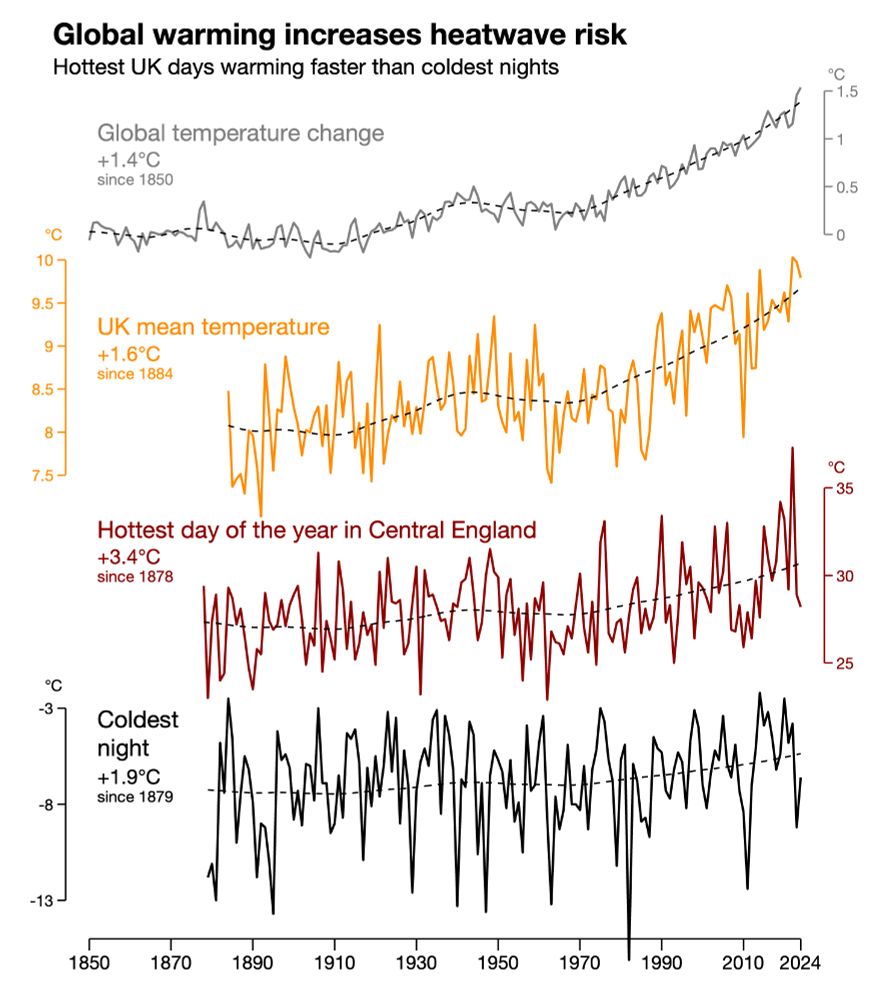
July 4, 2025 at 10:16 AM
In a UK newspaper opinion piece today, Matt Ridley (climate confuser) says: "winter nighttime temperatures have risen faster than summer daytime ones"
Um, no, not for the UK which the article is about. In fact, the hottest summer days are warming 2x faster than coldest winter nights. Sigh.
Um, no, not for the UK which the article is about. In fact, the hottest summer days are warming 2x faster than coldest winter nights. Sigh.
Did you mean these (from 3 years ago it seems)?


July 4, 2025 at 10:11 AM
Did you mean these (from 3 years ago it seems)?
Yes, I have a slightly broader analysis which looks at winter and Tmin etc. But, e.g. HadCET also shows the same Tmax feature over a longer timescale.

July 2, 2025 at 9:05 AM
Yes, I have a slightly broader analysis which looks at winter and Tmin etc. But, e.g. HadCET also shows the same Tmax feature over a longer timescale.
1°C of global warming does NOT mean that heatwaves 'just' get hotter by 1°C.
Over large parts of the UK, global warming means that heatwaves are 3-4°C warmer, with worse consequences for people and ecosystems.
Over large parts of the UK, global warming means that heatwaves are 3-4°C warmer, with worse consequences for people and ecosystems.
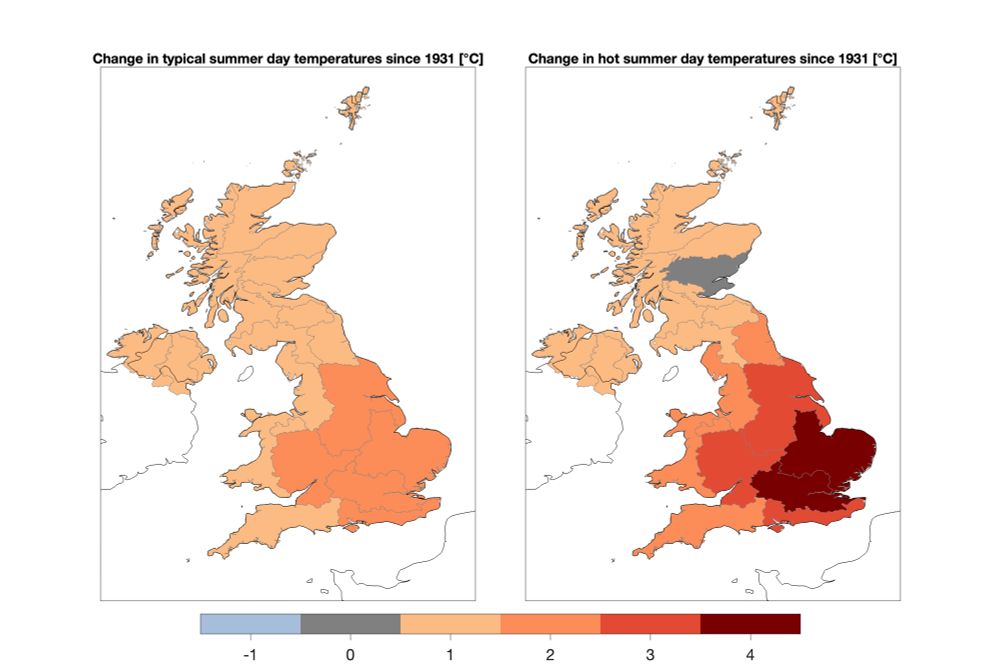
July 2, 2025 at 8:32 AM
1°C of global warming does NOT mean that heatwaves 'just' get hotter by 1°C.
Over large parts of the UK, global warming means that heatwaves are 3-4°C warmer, with worse consequences for people and ecosystems.
Over large parts of the UK, global warming means that heatwaves are 3-4°C warmer, with worse consequences for people and ecosystems.

June 30, 2025 at 2:38 PM
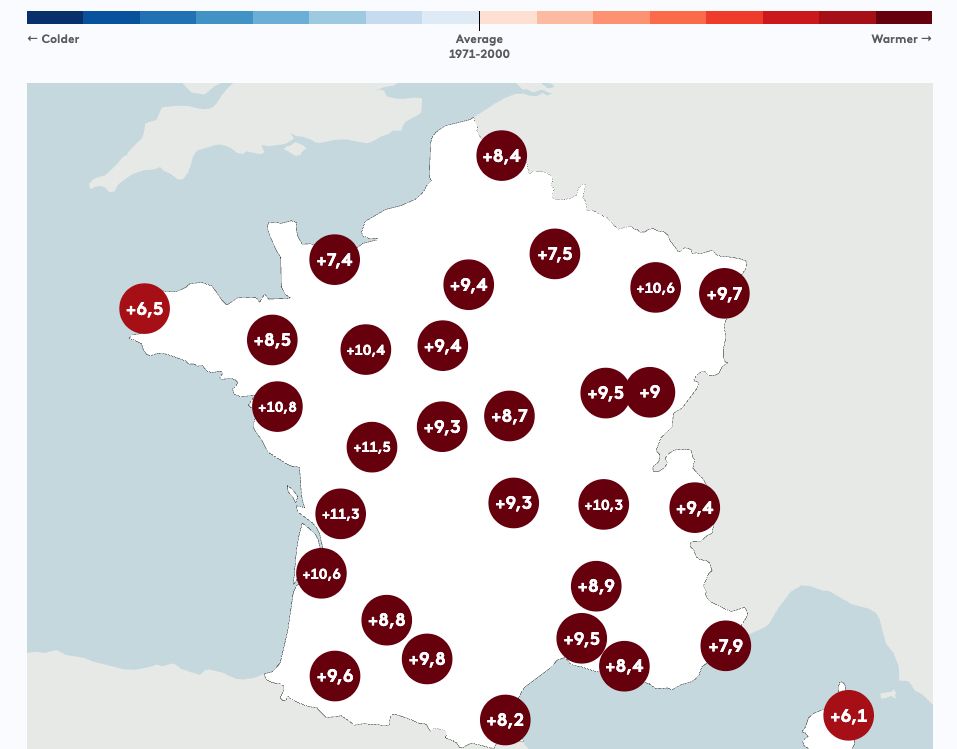
June 30, 2025 at 2:38 PM
Wide areas of the UK are currently 10-12°C above normal for the time of day and time of the year.
Updated every hour: istheukhotrightnow.com
Updated every hour: istheukhotrightnow.com

June 30, 2025 at 2:31 PM
Wide areas of the UK are currently 10-12°C above normal for the time of day and time of the year.
Updated every hour: istheukhotrightnow.com
Updated every hour: istheukhotrightnow.com

